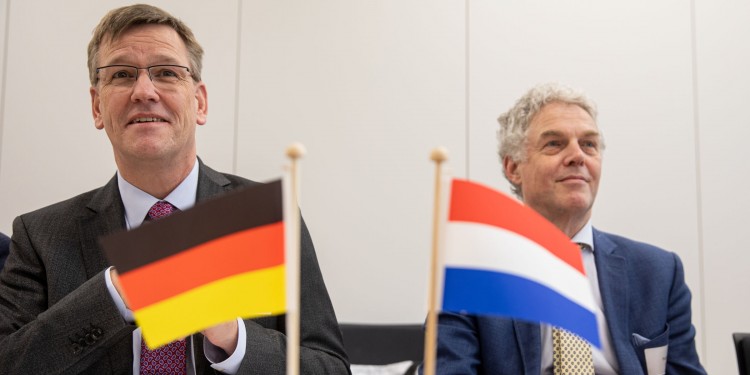
"We support cross-border cooperation"
The universities in Twente and Münster have maintained a close partnership for many years. Both universities work together in numerous areas. In addition to research cooperation and joint study programmes, both universities also offer regular exchanges for students and staff. The two university managements are now going one step further: they want to deepen their strategic partnership and identify opportunities for further cooperation and strengthen the existing research alliances.
In the coming weeks, the Communication and Public Relations Office of the University of Münster will publish a three-part series highlighting special features of this cooperation and providing insights into the areas of research, teaching, and transfer activities.
Part I: Strategy meeting of the Universities of Münster and Twente
Part II: Start-up culture and entrepreneurship
Part III: Research cooperation and Collaboration Grants
The variety of existing collaborations, which were already apparent at the strategy meeting in December last year between the Universities of Münster and Twente, was also reflected in the many high-quality project ideas that were submitted in late 2019 in the second tendering round for so-called Collaboration Grants. The managements of the Universities of Münster and Twente have used this funding instrument as a form of internal start-up financing to intensify existing research collaborations between the two universities and which, at the same time, have potential for acquiring third-party funding. “The Universities of Münster and Twente use Collaboration Grants to support outstanding scientific projects which have a particular potential to shape the strategic partnership between the two universities and advance it in the near future,” says Prof. Monika Stoll, Vice-Rector for Research at Münster. “We not only provide additional funding for researchers; we also support the cross-border cooperation and international visibility of both universities.”
The Collaboration Grants are each worth 80,000 euros, with each university, Münster and Twente, contributing 50 percent of the finance for a period of twelve months. Some of the things the funding goes to support are workshops for the formation of new consortia or networking events with partners from industry and business. The money can also be used for the purchase of new equipment and research instruments. The evaluation of the applications received was initially carried out independently by scientists from both universities on the basis of previously defined criteria. The independent evaluations were used in equal parts for the final selection of the three funded projects listed below. In their exchange of views on the results, the rectors decided to set up a joint commission for the evaluation in future.
Winning projects:
POTOC – Testis-on-chip approach to elucidate the impact of environmental plastic pollution on male fertility
Project leaders: Prof. Stefan Schlatt from the Centre for Reproductive Medicine and Andrology (CeRA) at the University of Münster, Prof. Séverine Le Gac from the Applied Microfluidics for BioEngineering Research group at the Faculty of Electrical Engineering, Mathematics and Computer Science at the University of Twente
ENERGIES – Thermal Conduits for Energy Conversion and Management in Batteries
Project leaders: Prof. Nikos Doltsinis from the Institute for Solid State Theory at the University of Münster, Dr. Jimmy Faria from the Faculty of Science and Technology, Prof. Bojana Rosic from the Applied Mechanics and Data Analysis group, and Dr. Miguel Muñoz Rojo from the Department of Thermal and Fluid Engineering at the University of Twente
Intelligent soft coatings – Development of New Strategies for Sensor Technology and Separation
Project leaders: Prof. Uwe Thiele from the Institute of Theoretical Physics at the University of Münster, Prof. Sissi de Beer from the Materials Science and Technology of Polymers group, and Prof. Jacco Snoeijer from the Physics of Fluids group at the University of Twente
The university managements awarded the first Collaboration Grants in 2018 for projects in the fields of medical imaging, nanotechnology and energy research. “We used the money primarily to finance equipment and instruments which make it possible to adopt new approaches and methods. As a result, we were able to push forward our research in the field of optical quantum computing,” says Wolfram Pernice from the Institute of Physics at Münster University. “In nanotechnology we complement each other perfectly: with their application-oriented research, the Dutch are making a significant contribution to increasing basic research at the University of Münster.” Out of the collaboration has emerged a project application to the German Research Foundation for a Collaborative Research Centre, which is currently being assessed.
The third tendering round for the Collaboration Grants is due to begin in the early summer of this year – and all researchers are invited to submit an application. After this, the managements of the two universities intend to make a decision on a continuation of the Collaboration Grants.
